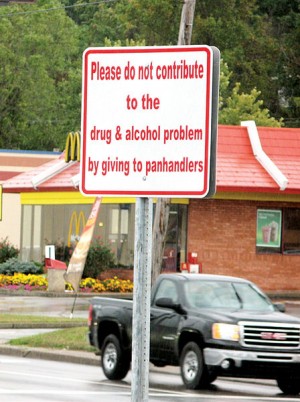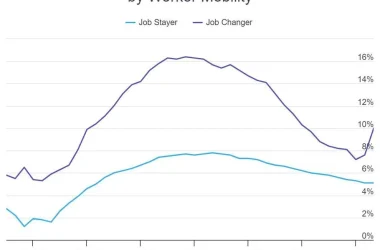
Signs like this one at the Memorial Bridge approach have been placed by city workers at frequent panhandling locations around Parkersburg.
PARKERSBURG, W.Va. — It remains to be seen whether recently placed signs will discourage giving to panhandlers, but one thing the placards have done is get people talking.
Parkersburg Mayor Bob Newell had signs reading “Please do not contribute to the drug & alcohol problem by giving to panhandlers” put up more than a week ago at the Memorial Bridge approach, the entrance to Wal-mart in south Parkersburg and the railroad trestle at Sixth and Ann streets. He said it was in response to an incident in which people were walking into traffic and asking for money at Camden Avenue and Division Street.
Since the signs went up, they’ve been a topic of conversation, drawing praise and criticism.
“I believe that it hurts the city’s appearance having panhandlers standing around at intersections,” Parkersburg resident Ray Sargent said in an email. “I mean, how safe and truthful are these panhandlers?”
But others found the signs, and particularly the message on them, problematic.
“That sign does not create community; it creates division,” said Williamstown resident Debbie Bird. “I think there is a sign that could be more appropriate.”
Bird said she too has concerns about how money given to panhandlers is used.
“I don’t give money,” she said. “I will carry Coca Cola and I will carry potato chips” to give people or offer hot coffee in the winter.
But Bird said the signs, as they are worded, are not helping matters. She believes new approaches must be found, especially to reach people who won’t, or perhaps even can’t, go through the normal channels to get help.
Zach Brown, executive director of the West Virginia Coalition to End Homelessness, said he was “taken aback” when he first heard about the signs.
“It makes a brash assumption that people are panhandling to get drugs and alcohol,” he said.
Brown said there are more people, total, living in homes and abusing drugs and alcohol than homeless individuals who do so.
“This is an awfully small percentage of the population to have a quote-unquote drug and alcohol problem,” he said.
Newell reiterated that he does not believe all panhandlers are drug addicts or alcoholics but there are a number of resources to help those who truly need assistance. And he added that he doesn’t consider the issue “a homeless problem” because some of the people panhandling have roofs over their heads
“It’s money (given) not necessarily for the right purpose,” Newell said.
The signs have the support of at least three members of City Council.
“I think they’re at least getting the point across,” Council President John Rockhold said. “I think it’s a fair assessment.”
Councilwoman Sharon Lynch and Councilman Mike Reynolds also voiced their support for the signs. Lynch said she’s received mostly positive feedback about them.
“The majority of the people are welcoming this,” she said. “I understand there are a few that think we’re being judgmental,” which is not the intent, she said.
Parkersburg City Council will take a final vote today on repealing a challenged panhandling ordinance and conduct the first reading of a new ordinance aimed at curbing aggressive solicitation.
Brown said the resources spent on the signs would be better used to get to the root of why people are on the street panhandling in the first place.
“To me it’s a little bit childish from the (perspective) of ‘we would just like the problem to go away,'” he said.
Newell said the city has attempted to address the problem, organizing meetings for groups that try to help the homeless and contributing grant funds to community groups, some of which covered first month’s rent and security deposits to help people get into apartments.
“We’ve actively pursued that. We’ve done it,” he said. “These folks that are asking for money, they’re not looking for those resources.”
In many cases, Newell said, it’s because local shelters and services prohibit alcohol consumption.
Tim Baer, People Assisting Those Experiencing Homelessness engagement specialist for Westbrook Health Services, said he feels the signs are a response to the concerns of residents and not necessarily intended to single out the homeless.
“I know that is an issue,” he said. “I can kind of see where they’re coming from.”
Baer said he encountered the individuals soliciting donations at Camden and Division and they gave a “black eye” to other panhandlers.
“I did not recognize those individuals as being members of our community,” he said. “I could see that they were somewhat invasive.”
The debate over the signs can be an opportunity to educate folks in the area about how they can make a difference, Baer said.
Brown agreed.
“It’s not going to move anything forward either if I’m just saying, ‘Take those signs down,'” he said.
The Coalition to End Homelessness is working on initiatives to do what its name says, Brown said. The latest effort is Zero:2016, a program which aims to erase veteran homelessness and chronic homelessness by the end of 2016.
To read more from The Parkersburg News and Sentinel, subscribe here.





